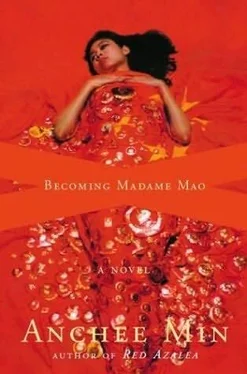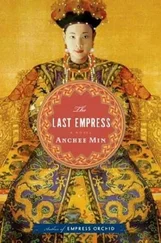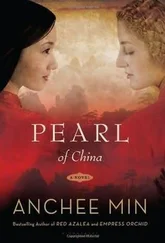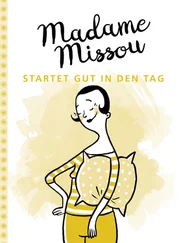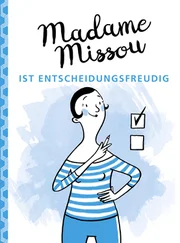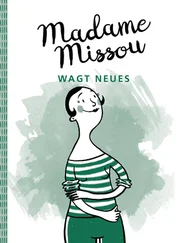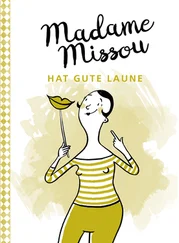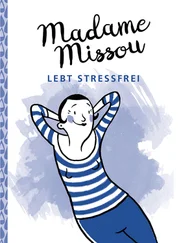Anchee Min - Becoming Madame Mao
Здесь есть возможность читать онлайн «Anchee Min - Becoming Madame Mao» весь текст электронной книги совершенно бесплатно (целиком полную версию без сокращений). В некоторых случаях можно слушать аудио, скачать через торрент в формате fb2 и присутствует краткое содержание. Жанр: Современная проза, на английском языке. Описание произведения, (предисловие) а так же отзывы посетителей доступны на портале библиотеки ЛибКат.
- Название:Becoming Madame Mao
- Автор:
- Жанр:
- Год:неизвестен
- ISBN:нет данных
- Рейтинг книги:4 / 5. Голосов: 1
-
Избранное:Добавить в избранное
- Отзывы:
-
Ваша оценка:
- 80
- 1
- 2
- 3
- 4
- 5
Becoming Madame Mao: краткое содержание, описание и аннотация
Предлагаем к чтению аннотацию, описание, краткое содержание или предисловие (зависит от того, что написал сам автор книги «Becoming Madame Mao»). Если вы не нашли необходимую информацию о книге — напишите в комментариях, мы постараемся отыскать её.
Becoming Madame Mao — читать онлайн бесплатно полную книгу (весь текст) целиком
Ниже представлен текст книги, разбитый по страницам. Система сохранения места последней прочитанной страницы, позволяет с удобством читать онлайн бесплатно книгу «Becoming Madame Mao», без необходимости каждый раз заново искать на чём Вы остановились. Поставьте закладку, и сможете в любой момент перейти на страницу, на которой закончили чтение.
Интервал:
Закладка:
2
SLOWLY MY MOTHER FADES from my life. It is said that she is married. To whom? She never introduces us to the new husband. She just disappears. Gone. The door is shut. I don't hear from her. She is done with parenting. I don't know what to do, only that I don't want to end up like her.
I watch operas and copy the arias. The Legend of Huoxiao Yu and Story of the West Chamber. I dream about the characters in the ancient tales, the rebellious heroines, women who fight fiercely for their happiness and get it. I decide that I shall be an opera actress so I will get to live a heroine's life on stage. But my grandfather opposes the idea. To him, actresses and prostitutes are the same. I don't give in. My grandfather regrets that he ever introduced me to opera. He threatens to disown me. But it is too late.
The girl is not sold to the opera troupe as she later claims. She runs away from home and delivers herself to a local troupe. She begs to be accepted. She is pretty, already a full-size young woman, already attractive. She claims to be an orphan. She runs away before her grandparents get a chance to disown her. This becomes a pattern in her life. With her husbands and lovers, she takes the initiative. She abandons before being abandoned.
The girl becomes an apprentice. While learning her craft she washes the floors, cleans makeup drawers, fills water jars and takes care of the leading actress's wardrobe. She gets to sit by the curtain during performances. Like a spring field in the season's first rain, she absorbs. During the New Year's Eve performance she gets to play her first one-line role. The line is: Tea, Madame.
For the role she dresses up in full costume. Her hair is up, pinned with pearls and glittering ornaments. In the mirror, in the painted face, in the red lips, the girl sees herself in the world she has been imagining.
Yet the place shows its ugly face. At night, after the performances, the girl hears sobbing. After her mistress takes off the makeup and costume, the girl sees a withered face. A young woman of twenty but who looks forty. A face of wood, carved heavily with wrinkles. There must be a ghost's hand working on this face, the girl thinks to herself.
When the girl goes out to fetch duck-blood soup on her mistress's order, she sees men waiting. Each night, a different man. They are the troupe owner's friends. Most of them are old, and a couple of them have a mouthful of gold teeth. The mistress is told to entertain them, to help them realize their fantasies. It doesn't matter that she is exhausted, doesn't matter that she wants to spend time with the young man of her heart.
The girl is waiting. She waits for a bigger role. For that she works hard, does everything she is told, endures an occasional beating. She tells herself to be patient, to perfect her skills. She is aware of the changes in her body. Aware that it is blooming. In the mirror she sees her eyes become brighter, her features ripening. Her waist grows smaller while her chest blossoms. She believes that her chance is coming her way. At night she dreams of the spotlight tracing her, only her.
I follow my grandfather and we head home. I am not giving up acting. I was not given the role I wanted to play. I was bored.
The wait was too long. I became sick of cleaning backstage. Sick of my rubber-faced mistress, her complaining, long and smelly words, like foot-binding cloths. My grandfather has paid a large sum to get me out of the troupe.
But when the moon buries itself in the deep drifts of cloud, my thoughts get busy again. I thought I had caught a glance, heard a tone, seized my dream, but… I stay wide awake in my old bed trying to figure out where to go and what to do next.
The sticky-rice-pasted wrapping cloths. The swelling toes. The inflammation. The prickling pain at the ankles. The girl remembers how she saved herself.
My grandparents are busy traveling from town to town and from matchmaker to matchmaker. They are trying get rid of me. I am sixteen years old, already beyond ruling. Because of my size, I am often mistaken as eighteen. They should have my feet bound. Now I can walk and run on this pair of-what my grandmother calls-liberation feet. My feet feel strong, as if they are on wings.
I run to free myself. I find another opera troupe. It is called the Experimental Theater Troupe of Shan-dong Province. It's bigger and better known, headed by a Confucius-looking man named Mr. Zhao Taimo.
Although Mr. Zhao Taimo has the look of Confucius, he is not a man of tradition by any means. He is a man of Western education. He is the torch that lights Yunhe's early life. Later on Madame Mao refuses to credit him for his guidance. Madame Mao takes all the credit for herself. It is because she is expected to prove that she was a born proletarian. But in 1929 it is Mr. Zhao Taimo who grants the girl admission even though she lacks important qualifications. Her Mandarin is poor and she has no acrobatic skills. Mr. Zhao is attracted instantly by the rebellious spirit in the girl. The bright almond eyes. The burning passion behind them. From the way the girl marches into the room, Mr. Zhao discovers a tremendous potential.
The circle of literature and arts in Shan-dong regards Mr. Zhao as a man of inspiration. His wife, the elegant opera actress Yu Shan, is popular and adored. Yu Shan is from a prestigious family and is well connected. The girl Yunhe comes to worship the couple. She becomes a guest at the Zhaos' open house every Sunday afternoon. Sometimes she even comes early in the morning, skipping her breakfast, just to watch Yu Shan go through her opera drills. Yunhe's modesty and curiosity impress Yu Shan and the two become good friends.
At parties, Yunhe is usually quiet. She sits in the corner chewing sunflower seeds and listens. She observes the visitors. Most of them are students, professors, musicians and playwrights. There are mysterious visitors too. They are the left-wingers-the underground Communists.
My first encounters with the revolutionaries take place at Mr. Zhao Taimo's parties. I find them young, handsome and passionate. I look at them with respect. I can never forget those bloody heads hung on the poles. What is it that makes them risk their lives?
In Mr. Zhao Taimo's house I find the answer. It is their love for the country. And I think that there is nothing in life more honorable than what they do.
The girl suddenly has the urge to join the discussion. It takes her a while to finally gather her courage and project her voice.
I was never told that the foreign occupation was the result of our nation's defeat, the girl says. In my schoolbook China is as glorious as it has always been. But why are foreigners the masters of factories, owners of railways and private mansions in our country? I remember once my grandfather sighed deeply and said that it was useless to learn to read-the more one was educated, the deeper one felt humiliation. I now understand why my grandfather loves opera. It is to numb himself. In opera he relives China's past splendor. People are fooling themselves.
At the school Yunhe proves herself to be an ardent student. Her shirt is constantly wet with sweat. Bruises are visible on her knees and elbows from practicing martial arts. During voice class she spends hours studying one aria and won't quit until it is perfect. The teachers are pleased by the high expectations she sets for herself and she is adored. After classes one can hear Yunhe's laughter. It sounds like bells. The male students find it extremely pleasant. They find themselves unable to take their eyes off the girl. There is something about her that is utterly irresistible. It catches their attention and has a mysterious effect on them.
Not only does the girl love drama, she creates drama in her daily life. It becomes her interest first, then it extends itself to become a need, an obsession and an addiction. Finally her entire existence is based on it, her fantasy-she has to feel dramatic, has to play a role, or she gets restless, stressed and sick. She doesn't get well until she assigns herself another role.
Читать дальшеИнтервал:
Закладка:
Похожие книги на «Becoming Madame Mao»
Представляем Вашему вниманию похожие книги на «Becoming Madame Mao» списком для выбора. Мы отобрали схожую по названию и смыслу литературу в надежде предоставить читателям больше вариантов отыскать новые, интересные, ещё непрочитанные произведения.
Обсуждение, отзывы о книге «Becoming Madame Mao» и просто собственные мнения читателей. Оставьте ваши комментарии, напишите, что Вы думаете о произведении, его смысле или главных героях. Укажите что конкретно понравилось, а что нет, и почему Вы так считаете.
